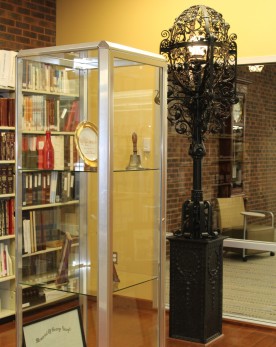This is an updated reprint of a “From the Local History Room” column that first appeared in Oct. 2013, just before the launch of this weblog.
Rev. George W. Minier, founder of Minier
By Jared Olar
Library assistant
The largest community in Tazewell County’s Little Mackinaw Township is the village of Minier, which was founded nearly 146 years ago. Ben C. Allensworth’s 1905 “History of Tazewell County,” page 854, describes Minier’s founding and early years in this way:
“The village of Minier is located on Section 22 at the intersection of the Kansas City branch of the Chicago & Alton Railroad and the Illinois Midland. It was laid out October 18, 1867, by George W. Minier, Charles E. Boyer and others. The site where Minier was located up to the time of the building of the Chicago & Alton Railroad was a low flat prairie, and there were ponds of water within the present limits of the village that scarcely went dry during the entire season. Mr. J. M. Edmiston was the first resident of Minier, being employed by the Chicago & Alton Railroad Company as its agent, and his residence was the first house built in the city. Shortly afterwards the railway company erected a water-tank at that place which was visible for miles around, and the town was nicknamed ‘Tank,’ which name it wore for several years.”
The 1873 Atlas Map of Tazewell County shows that Minier’s founder and namesake, the Rev. George Washington Minier, then lived on a farmstead along the southern boundary of Minier. J. M. Edmiston, the first resident, was apparently Rev. Minier’s son-in-law James Edmiston, husband of Minier’s daughter Eliza Jane, who was one of the 12 children of Minier and his wife Sarah Ireland. That and other details can be gleaned from the published biography of Rev. Minier found on pages 237-38 of the 1894 “Portrait and Biographical Record of Tazewell and Mason Counties.”

The Rev. George Minier, a pioneer settler of Tazewell County, was the founder of the Tazewell County village of Minier in Little Mackinaw Township.
The biography calls Rev. Minier “one of the early settlers of Tazewell County, and a pioneer Christian preacher of western Illinois.” In 1894, he was living in Section 13 of Little Mackinaw Township. Rev. Minier was born in Ulster Township, Bradford County, Pa., on Oct. 8, 1813, one of the 10 children of John Minier, whose father Daniel Minier is said to have served under Gen. George Washington during the Revolutionary War. Born in Lycoming County, Pa., John Minier moved to Bradford County, where he worked as a farmer. In 1839, John moved to Bureau County, Ill., where he died around 1841.
The published biography goes on to say that John’s son George “was reared in Bradford County, and was educated in the public schools and Athens Academy. He often walked six miles to and from school. When his college course was completed he engaged in teaching in Chemung, N. Y., for three years, and in 1837 emigrated to Chicago, Ill., where he met ‘Long John Wentworth.’” — a Chicago newspaper editor who served two terms as mayor of Chicago.
The account continues:
“He then went to Bureau County and engaged in surveying the state road from Peru to Galesburg. In 1839 he was employed as a civil engineer on the main line of the Illinois Central Railroad, and aided in the survey of the Illinois River. His work along that stream brought on an attack of ague, which lasted for fourteen months, after which he resumed teaching near Princeton, Ill.
“Three years were spent as a teacher in Magnolia, Putnam County, after which he became a preacher of the Christian Church, and continued in the work of the ministry in McLean and Tazewell Counties for many years. He was also at the head of a female college in Bloomington, which he sold in 1850 to Dr. Finley. The following year he came to Tazewell County, and with a land warrant secured one hundred and sixty acres of Government land at eighty-three cents per acre. It was a tract of unbroken prairie, but he cleared and improved it, and has since made his home thereon. In connection with farming, he has also continued his work as a Christian minister.”
It was in 1842 that Rev. Minier was ordained a minister of the Christian Church. During his ministry, he pastored many churches throughout central Illinois, including churches in Lincoln, Atlanta, Armington, Washington, Concord, Minier, Delavan and Emden. Besides his religious endeavors, he also was active in politics. “In early life he was a Democrat in politics, but was a stanch (sic) Republican from the organization of the party until a short time since, when he joined the Prohibition party, and was the first man ever nominated in the United States for Congress on the Prohibition ticket. He was a warm personal friend of Abraham Lincoln,” the biography says.
As a proponent of the prohibition of alcohol, Minier spent most of his life as a member of the Sons of Temperance. He also spoke out against war. “He is a member of the Peace Congress of the United States and was elected a delegate to the World’s Convention in London, where he was to read a paper. Being prevented from going, he however sent the article which he had prepared, and which was read before that body,” according to the biography. Rev. Minier also was involved in the organizing and founding of Illinois State University.
He died on Feb 18. 1902, and is buried with his wife Sarah in Glenwood Cemetery, Mackinaw.
